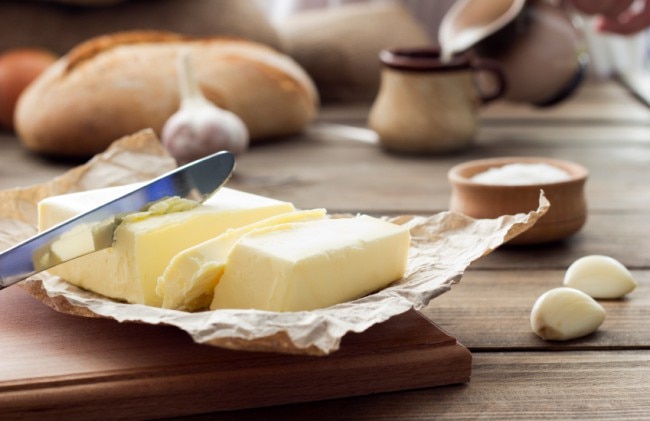Newly unearthed research has further whipped up debate over whether consuming butter is better or worse than consuming vegetable oil.
A research team led by scientists at the University of North Carolina School of Medicine and the National Institutes of Health recently published a study, based on data mined from a large research project conducted in the 1960s, that reported consuming vegetable oils high in linoleic acid might harm your heart health more than consuming butter. Types of oil that are rich in linoleic acid — an essential omega-6 unsaturated fatty acid — include corn, safflower, soybean, sunflower and cottonseed.
This study calls into question a longtime recommendation — backed by the federal government and the American Heart Association, among others — that we should reduce saturated fats in our diet (butter) in favor of polyunsaturated fats (vegetable oil). The researchers concede that more research needs to be done to flesh out their finding.
Some critics have attacked the study. Dr. Walter Willett, chairman of the nutrition department at the Harvard School of Public Health, says the research “adds no useful new information and is irrelevant to current dietary recommendations that emphasize replacing saturated fat with polyunsaturated fat … .” Harvard colleague Dr. Frank Hu agrees, calling the study “flawed.”
So, who’s right and who’s wrong? If only the answer were a simple one. To gain clarity on this issue, we asked several health and nutrition experts to weigh in on the slippery butter-vs.-oil debate.
Dr. RJ Burr, a chiropractor, is on Team Butter. He and other experts highly recommend organic butter from grass-fed cows.
“The only pros to vegetable oil are that it’s cost-effective and easy to cook with, and has a long shelf life. There are only health cons,” Burr says.
Burr recommends avoiding vegetable oil in large part because it’s heavily processed. He says the chemical and heat processing creates free radicals and inflammatory trans fats. The trans fats damage the walls of our blood-vessel walls, Burr says. Meanwhile, the free radicals — the archenemy of antioxidants — damage our cells.
To make matters worse, Burr says production of free radicals goes up when we cook with vegetable oil.
“When we consume vegetable oil every day — much less every meal, like most Americans — it’s no wonder why our heart disease rates have risen since the low-fat revolution of the ’60s,” Burr says.
Like Burr, Dr. Meagan Purdy, a naturopathic physician, is a butter proponent.
“Butter got a bad rap in the ’90s when low-fat diets were all the rage, but now nutrition experts have found that sugars and simple carbohydrates are actually the source of our rising rates of heart disease, obesity and diabetes, not dietary fat,” Purdy says.
In short, butter beats vegetable oil because butter is a “whole, fresh food” and vegetable oil is not, says Ken Immer, president and chief culinary officer of Culinary Health Solutions. However, he points out that butter contains heart-unhealthy “bad” cholesterol, while vegetable oil does not.
“If you are someone who is avoiding dietary cholesterol, then butter may not be a better choice,” Immer says.
Dr. Morton Tavel, clinical professor emeritus of medicine at Indiana University’s School of Medicine, says he and other doctors have been preaching for years about eliminating butter, a prime source of saturated fat, from our diets to lower the risk of heart disease. Tavel emphasizes that one tablespoon of butter contains 7 grams of saturated fat — about half the recommended intake if you’re following a 2,000-calorie-a-day diet.
Margarine used to be the go-to replacement for butter, Tavel says, but since most margarine contains unhealthy trans fat, margarine has fallen out of favor.
Rather than slathering bread with margarine or dairy butter, consider spreads without trans fat and with the lowest amount of saturated fat, Tavel says. Alternatives include nut and seed butters, mashed avocado and hummus, all of which offer a “better-than-butter fat mix,” he says.
Even higher-calorie peanut butter is an option, as it provides about 8 grams of protein per two-tablespoon serving. Furthermore, the fat found in peanut butter is mostly the good kind.
“You may get more health benefits if you keep an open mind about what to spread on your bread. A great choice is extra virgin olive oil, a common offering in upscale restaurants,” Tavel says.
What about butter and oil in cooking?
Immer says the best vegetable oils for cooking are refined coconut oil and avocado oil, both of which have a high smoke point. When the smoke point is low, beneficial nutrients are lost and free radicals are generated. He also recommends ghee — clarified butter that lacks the dairy proteins — as it, too, boasts a high smoke point.
For her part, Maryam Farvid, a visiting scientist at the Harvard School of Public Health, dismisses the new butter-is-better research and suggests cooking with vegetable oils like soybean, corn, olive and canola in a bid to swap less desirable saturated fats for more desirable unsaturated fats.
Immer warns against cooking with butter “because it invites us to use more of it, and most people don’t need help adding extra fat to their diets, which is where a lot of extra calories can show up in our food.”
Purdy stresses that butter works better in cooking than vegetable oil does because it maintains its chemical structure and doesn’t convert into toxic chemicals connected to cancer and other diseases.
“Vegetable, corn and canola oils are a relatively new dietary item in our world, and there’s truly nothing natural or healthy about them. They are not meant to be food,” Purdy says.




